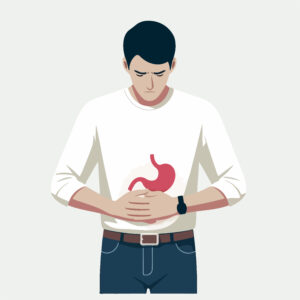
Digestive health plays a vital role in overall well-being. A healthy gut helps in nutrient absorption, energy production, and even supports immunity. Unfortunately, there are many myths and misconceptions about digestive health that people continue to believe. These myths often lead to wrong choices, unnecessary stress, and even delay in seeking proper treatment.
In this article, we’ll explore the most common myths about digestive health, explain the truth behind them, and share expert advice for better gut care. If you’ve ever searched for a “liver specialist doctor near me” or wondered whether you need a dr liver specialist, understanding the facts can help you take smarter steps toward maintaining your digestive system.
Myth 1: Spicy Food Always Causes Ulcers
- The Myth: Many believe eating spicy food directly causes stomach ulcers.
- The Truth: Ulcers are mainly caused by Helicobacter pylori (H. pylori) infection or long-term use of painkillers (NSAIDs). While spicy food can irritate an existing ulcer, it doesn’t actually cause it.
Myth 2: Heartburn and Acid Reflux Are the Same
- The Myth: People often think heartburn and acid reflux mean the same thing.
- The Truth: Heartburn is a symptom—a burning feeling in the chest. Acid reflux is the actual condition where stomach acid flows back into the esophagus. Reflux may cause heartburn, but not always.
Myth 3: Drinking Milk Cures Acidity
- The Myth: Many people drink milk thinking it will cure acid reflux.
- The Truth: While milk may temporarily soothe the stomach, it can also trigger acid production later, making reflux worse. Long-term acidity needs proper treatment, not just milk.
Myth 4: Constipation Means You’re Unhealthy
- The Myth: If you don’t have a bowel movement daily, you’re constipated and unhealthy.
- The Truth: Bowel habits vary for everyone. Some people go once a day, others three times a week. What matters is whether your stool is hard, painful, or infrequent compared to your normal pattern.
Myth 5: All Probiotics Are the Same
- The Myth: Any probiotic product will improve gut health.
- The Truth: Different probiotics support different functions. For example, some help with diarrhea, while others help with irritable bowel syndrome (IBS). Not all probiotics work the same, and consulting a doctor ensures the right choice.
Myth 6: Only Older Adults Get Digestive Problems
- The Myth: Digestive issues like acidity, gallstones, or liver disease only happen in older people.
- The Truth: Poor diet, stress, alcohol, and lifestyle factors can affect anyone, even young adults. Early care and healthy habits are important for all age groups.
Myth 7: Liver Cleansing Products Work Wonders
- The Myth: Herbal teas or detox drinks can cleanse and heal the liver.
- The Truth: The liver naturally detoxifies the body and does not require cleansing products. In fact, some of these products can harm the liver. A healthy diet and lifestyle are the real keys to liver care.
Myth 8: Stomach Pain Is Always Due to Gas
- The Myth: Most people dismiss stomach pain as “just gas.”
- The Truth: While gas is common, constant or severe abdominal pain could be a sign of gallstones, ulcers, or even appendicitis. Never ignore ongoing or worsening pain—seek medical advice.
Tips for a Healthy Digestive System
- Eat a balanced diet rich in fiber, fruits, and vegetables.
- Stay hydrated with water and avoid too many sugary or carbonated drinks.
- Exercise regularly to improve bowel movement.
- Avoid overuse of painkillers that can damage the stomach lining.
- Limit alcohol and smoking to reduce liver and stomach risks.
- Get regular check-ups, especially if you have symptoms like constant acidity, bloating, or abdominal pain.
FAQs About Digestive Health Myths
Q1. Does stress really affect digestion?
Yes. Stress can slow digestion, cause bloating, and trigger conditions like IBS. Relaxation techniques like yoga and meditation can help.
Q2. Can acidity lead to cancer?
Long-term untreated acid reflux (GERD) can increase the risk of esophageal cancer, so it’s important to get treatment if symptoms persist.
Q3. Should I take probiotics daily?
Not everyone needs daily probiotics. The type, dose, and duration depend on your health condition. Always consult a doctor before long-term use.
Q4. Is drinking cold water harmful for digestion?
No. Cold water does not harm digestion. What matters more is eating healthy and staying hydrated.
Q5. When should I see a specialist for digestive issues?
If you have symptoms like chronic acidity, unexplained weight loss, blood in stool, or severe stomach pain, it’s time to consult a gastroenterologist or liver specialist.
Conclusion
Digestive health is often surrounded by myths, but knowing the truth is key to prevention and treatment. Instead of relying on home remedies or popular misconceptions, always trust medical experts for guidance. If you’re struggling with ongoing issues like acidity, bloating, or liver-related concerns, don’t ignore them—consult a trusted professional such as a dr liver specialist.
